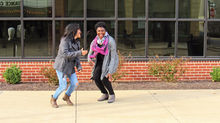MYTHBUSTERS: We Are All One Race
- Feb 14, 2017
- 4 min read

CLAIM: We're all one race...the human race.
Is this true? Are we all really one race?
No, we are not.
This statement is quite the hurtful myth, as are its infamous cousins "I don't see race," and "We should all be colorblind." Race seems to be one of those human variances we have trouble getting past, and there are some interesting tidbits on race that most are not aware of. You know what that means: we're breaking it down for you here on this episode of Mythbusters.

To start, what is race? Dictionary.com defines race as "each of the major divisions of humankind, having distinct physical characteristics; a group of people sharing the same culture, history, language, etc." Race is not the same as ethnicity, though the two can be related. For instance, my race is Black. I share distinct physical characteristics, cultural norms, etc with others who identify as Black. My ethnicity is Jamaican American, and while I may share some language, cultural norms, and the like with other Jamaicans, these will be drastically different from a Nigerian friend's cultural norms, language, or history--even though my Nigerian friend is Black. Does this make sense? Perfect.
(That face you make when they keep switching your race around)

Now onto the next tidbit of information on race: it's not real. Yup, that's right, it's made up. Race is a social construct designed to categorize and, in some cases, divide. Back when the United States was first being formed, immigrants received certain rights and privileges depending on whether or not they were White, and there were many cases where the courts had to decide on who was considered White. Jews and Japanese are a couple of ethnic minorities who fought for the right to be White in order to receive the same rights as their White counterparts. In 1929, Mexicans or those of Mexican descent were considered White--then in 1930, to limit immigration, they were considered non-White--and then, in 1942, they were once again considered White! To be Black could mean anything from having 1/5th African ancestry to only "one drop," and this standard varied for a long time from state to state.
Let's go back to the original question: are we all one race? Well, technically, none of us are any race, so if we're going by that argument, the answer would be no by default. However, despite the fact that there is no biological basis for race as we know it today, it still plays a HUUUUUUUGGEEEE roll in our lives. This brings us to another point: why is it hurtful when people claim that they don't see color, or that color doesn't matter to them, etc? As much as we'd like to deny that it exists, pretend to be colorblind, or act like it doesn't effect our human experience, the truth of the matter is that it does. "Race" may not exist per say, but the physical and cultural differences between us do, and there's no denying that. I have brown skin. I was born with it, and I will die with it unless I chemically alter it. I have afro hair. I altered it chemically when I was younger, but do not plan on going back to straight hair permanently, as my fro is a source of cultural pride for me. I am Jamaican. My family listens to reggae, celebrate Jamaican Independence Day, and cook traditional foods from the island.
(That face you make when you know folks see your brown skin right there on your body)

I am proud of my skin tone and the culture, heritage and history tied to it--so when someone says they don't see race, they don't see color, or that we should all just be colorblind, this tells me that we should strip away every last ounce of history in me. It disregards the experiences I've had as a woman of color. It discredits the struggles I've had to overcome. The struggles my parents, grandparents, and great grandparents have had to overcome. The problem is not that race or differences exist; the problem is that we use these differences to create a hierarchy and justify maltreatment of those who are supposedly further down on the totem pole than we are. When a child comes home talking about his friend with glasses, we don't shush this child and quickly say, "we don't see the glasses! Just pretend they're not there!" When a child comes home and says his friend has green eyes, we don't tell them, "we don't see color. Everyone's eyes are grey to us." Our features are a part of who we are. We are taught to love ourselves and love others--that includes loving the color of ourselves, and appreciating the color of others.
Did I get a little preachy there? Just call me pastor....no, don't call me pastor. That's not a hat I wish to wear. Although maybe a magician's hat...
This is off topic.
To answer our question once more: We are not all one race. We are not all the same. We are vastly different, though we are also more similar than we'd like to acknowledge. There's a poem on a poster at one of my jobs that reads:
He Prayed - It Wasn't My Religion
He Ate - It Wasn't What I Ate
He Spoke - It Wasn't My Language
He Dressed - It Wasn't What I Wore
He Took My Hand - It Wasn't The Color Of Mine
But When He Laughed - It Was How I Laughed and
When He Cried - It Was How I Cried.......
~Amy Maddox
**mike drop**
**sexual chocolate**
(Any Coming to America fans here? If not, please look that up on Youtube or Netflix...it'll be one of the best things you've ever seen. Promise. Scout's honor.)
Videos with More Info:
https://www.youtube.com/watch?v=_qaWp8_z81w
https://www.youtube.com/watch?v=VnfKgffCZ7U
https://www.youtube.com/watch?v=KzANAr1V82c
Best,
Reina









































Comments